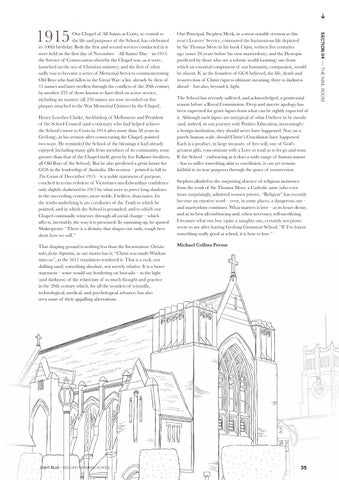↓ Our Chapel of All Saints at Corio, so central to the life and purposes of the School, has celebrated its 100th birthday. Both the first and second services conducted in it were held on the first day of November – All Saints’ Day – in 1915: the Service of Consecration whereby the Chapel was, as it were, launched on the sea of Christian ministry; and the first of what sadly was to become a series of Memorial Services commemorating Old Boys who had fallen in the Great War: a list, already by then of 15 names and later swollen through the conflicts of the 20th century by another 235 of those known to have died on active service, including six masters (all 250 names are now recorded on five plaques attached to the War Memorial Cloisters by the Chapel). Henry Lowther Clarke, Archbishop of Melbourne and President of the School Council (and a visionary who had helped achieve the School’s move to Corio in 1914 after more than 58 years in Geelong), in his sermon after consecrating the Chapel, pointed two ways. He reminded the School of the blessings it had already enjoyed (including many gifts from members of its community, none greater than that of the Chapel itself, given by five Falkiner brothers, all Old Boys of the School). But he also predicted a great future for GGS in the leadership of Australia. His sermon – printed in full in The Corian of December 1915 – is a noble statement of purpose, couched in terms redolent of Victorian-cum-Edwardian confidence only slightly darkened in 1915 by what were to prove long shadows in the succeeding century; more noble, I believe, than naïve, for the truths underlying it are corollaries of the Truth to which he pointed, and in which the School is grounded, and to which our Chapel continually witnesses through all social change – which affects, inevitably, the way it is presented. In summing up, he quoted Shakespeare: “There is a divinity that shapes our ends, rough hew them how we will.” That shaping ground is nothing less than the Incarnation: Christus nobis factus Sapientia, as our motto has it; “Christ was made Wisdom unto us”, as the 1611 translators rendered it. That is a rock, not shifting sand; something absolute, not merely relative. It is a brave statement – some would say bordering on bravado – in the light (and darkness) of the relativism of so much thought and practice in the 20th century which, for all the wonders of scientific, technological, medical, and psychological advance, has also seen some of their appalling aberrations.
LIGHT BLUE - GEELONG GRAMMAR SCHOOL
Our Principal, Stephen Meek, in a most notable sermon at this year’s Leavers’ Service, contrasted the harmonious life depicted by Sir Thomas More in his book Utopia, written five centuries ago (some 20 years before his own martyrdom), and the Dystopia predicted by those who see a robotic world looming: one from which an essential component of our humanity, compassion, would be absent. If, as the founders of GGS believed, the life, death and resurrection of Christ express ultimate meaning, there is darkness ahead – but also, beyond it, light. The School has recently suffered, and acknowledged, a penitential season before a Royal Commission. Deep and sincere apology has been expressed for grave lapses from what can be rightly expected of it. Although such lapses are untypical of what I believe to be mostly (and, indeed, in our journey with Positive Education, increasingly) a benign institution, they should never have happened. Nor, on a purely human scale, should Christ’s Crucifixion have happened. Each is a product, in large measure, of free will, one of God’s greatest gifts, concomitant with a Love so total as to let go and trust. If the School – embracing as it does a wide range of human nature – has to suffer something akin to crucifixion, it can yet remain faithful to its true purposes through the grace of resurrection. Stephen alluded to the surprising absence of religious insistence from the work of Sir Thomas More, a Catholic saint (who even more surprisingly, admitted women priests). “Religion” has recently become an emotive word – even, in some places, a dangerous one – and martyrdom continues. What matters is love – at its heart divine, and at its best all-embracing and, when necessary, self-sacrificing. I treasure what one boy (quite a naughty one, certainly not pious) wrote to me after leaving Geelong Grammar School: “If I’ve learnt something really good at school, it is how to love.” Michael Collins Persse
35
SECTION 04 — THE MAIL ROOM
1915
